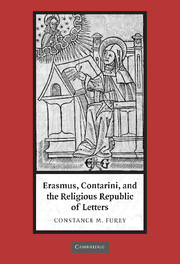Introduction
Published online by Cambridge University Press: 10 December 2009
Summary
But what a sidetrack our discourse is taking! My intention was to outline a way of life for you, not a course of study.
Erasmus, Enchiridion (1503)This disclaimer should give us pause. elsewhere in erasmus's great handbook of lay piety he tells Christians that they need knowledge as well as prayer to persevere against the forces of evil, and Erasmus was himself a great scholar. Together with his celebration of an interior piety accessible to lay people, his emphasis on the spiritual meaning of the Bible, and his critiques of ritualism, this assertion that learning is the cornerstone of a good Christian way of life is widely viewed as a hallmark of Erasmian spirituality. There are pungent critiques of scholarship in the Enchiridion, but this is because, as John O'Malley explains, Erasmus thought that so much scholarship was badly done. Like many other Catholic intellectuals, Erasmus blamed scholasticism for promoting the notion that theology was a contemplative discipline, divorced from piety and ministry. Contemporary theologians, he thought, subsequently promoted an arid intellectualism. The easiest way to interpret Erasmus's claim that he had gotten waylaid by talking about scholarship, then, is to conclude that he was trying to get his readers to think about the relationship between learning and life. His basic message seems clear: People should look beyond narrowly defined academic disciplines in order to embrace the sort of knowledge that encourages virtuous living.
- Type
- Chapter
- Information
- Publisher: Cambridge University PressPrint publication year: 2005



